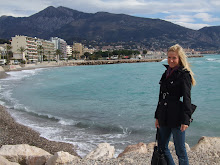One of the many highlights of my British experience was spent on the Dorset Coast of Southern England. For several nights I camped on the rolling hills of an organic farm before hiking the Dorset Coast Path along the rocky ridge lines and white cliff edges of the Jurassic Coast to Lulworth Cove. This is where the spectacular "Durdle Door" is located- a natural limestone arch protruding into the waters of the English Channel. Despite it's status as a UNESCO World Heritage Site, the area suffers the impacts of marine debris. So as the rest of the visitors sunbathed and BBQ'ed, I spent the day cleaning the beach.
A bit farther west along the English Channel is Plymouth- the town best known to Americans as the port of embarkation for the Mayflower in 1620. I spent some time at the University of Plymouth where marine ecologist and biologist, Richard Thompson, is at the forefront of research in what he calls "microplastics," a microscopic form of marine debris likely formed from the breakdown of items such as plastic bags and bottles. By the use of an incredibly powerful mass spectrometer, he is able to positively identify some of the microscopic particles as various types of synthetic, man made polymers. His team is currently trying to assess the environmental impacts of this type of debris. I spoke with one of his graduate students, who is looking into the prevalence of microplastics in the tissues of mussels. I was able to join him while he sampled at a really remote site called Whitsand Bay. And, of course, killing two birds with one stone, I cleaned the beach while I was there, too.
I also spend a good deal of my time in Wales which deserves to be touched upon when I have a bit more time. So stay posted...
Next stop: Reykjavik, Iceland







No comments:
Post a Comment